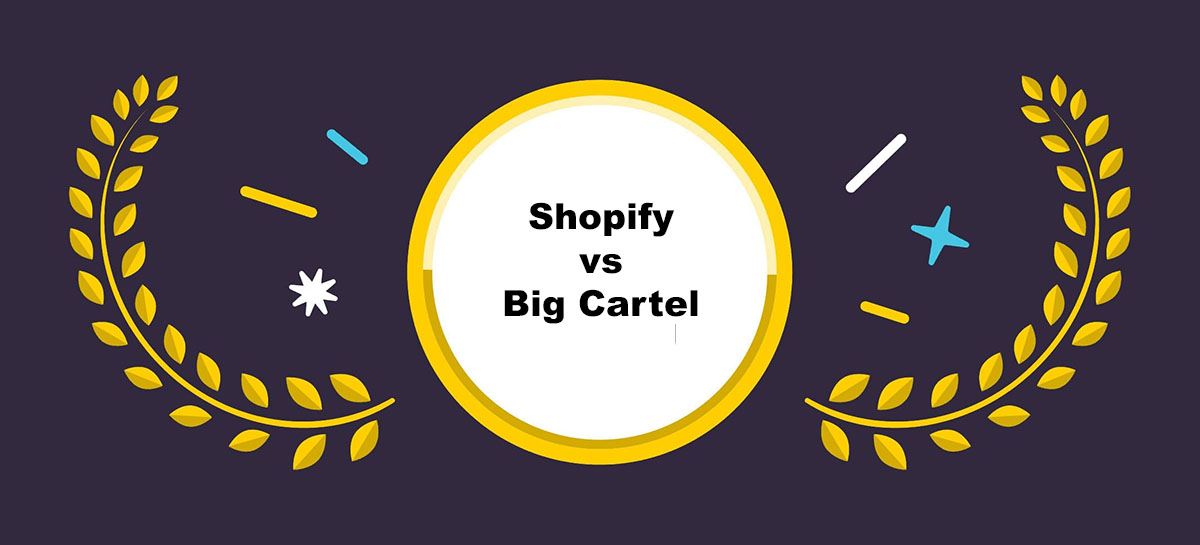Shopify and Big Cartel are two very different tools — and if you’re deciding between them, the choice really comes down to one question: Are you building a brand, or just listing a few products online?
I’ve been running ecommerce stores for over a decade now. I’ve launched brands on both platforms, helped beginners get their first sale, and scaled stores from zero to six figures.
After all that, I’ve seen where each platform shines — and where it falls flat.
Big Cartel is a simple option built for creatives, artists, and hobby sellers. It’s free, fast to set up, and does the job if you’re just trying to dip your toes in.
Shopify? It’s built for scale. You get proper tools, real support, and the power to turn a product idea into a business.
So let’s break it all down — real-world use, not feature checklists.
Shopify vs Big Cartel: Quick Verdict
Shopify – Best for building a real business, growing traffic with SEO, and selling across multiple channels.
Big Cartel – Best for beginners and small-time sellers who want a free store with fewer moving parts.
Big Cartel is best for:
- Artists or creatives selling fewer than 50 products
- People who want a free, quick setup
- Sellers who aren’t focused on growth, SEO, or marketing
Shopify is best for:
- Business owners who want to scale
- Sellers focused on SEO, blogging, or email marketing
- People who want full control of how they sell and grow
Quick Comparison: Shopify vs Big Cartel
Let’s start with a head-to-head overview. Here’s how the two platforms compare when it comes to the basics:
| Feature | Shopify | Big Cartel |
|---|---|---|
| Overall Rating | 4.8 | 3.4 |
| Starting Price | $29/month | Free |
| Free Trial | 3 days, then $1/month for 3 months | Always free (up to 5 products) |
| Templates | 100+ | 18 |
| SEO Tools | Strong | Weak |
| Apps & Add-ons | 8000+ | None |
| Best For | Scaling a brand | Testing a product idea |
Best for Pricing: Big Cartel Is Cheaper — But Shopify Brings More Value
When people ask me about platforms, this is where most of them start: “How much does it cost?” And that’s fair — pricing matters. But what matters more is what you’re actually getting for your money.
Big Cartel offers one of the few genuinely free ecommerce plans out there. You can launch a store, upload a handful of products, and start selling — all without paying a penny.
That’s a huge win for beginners or artists who just want to test the waters.
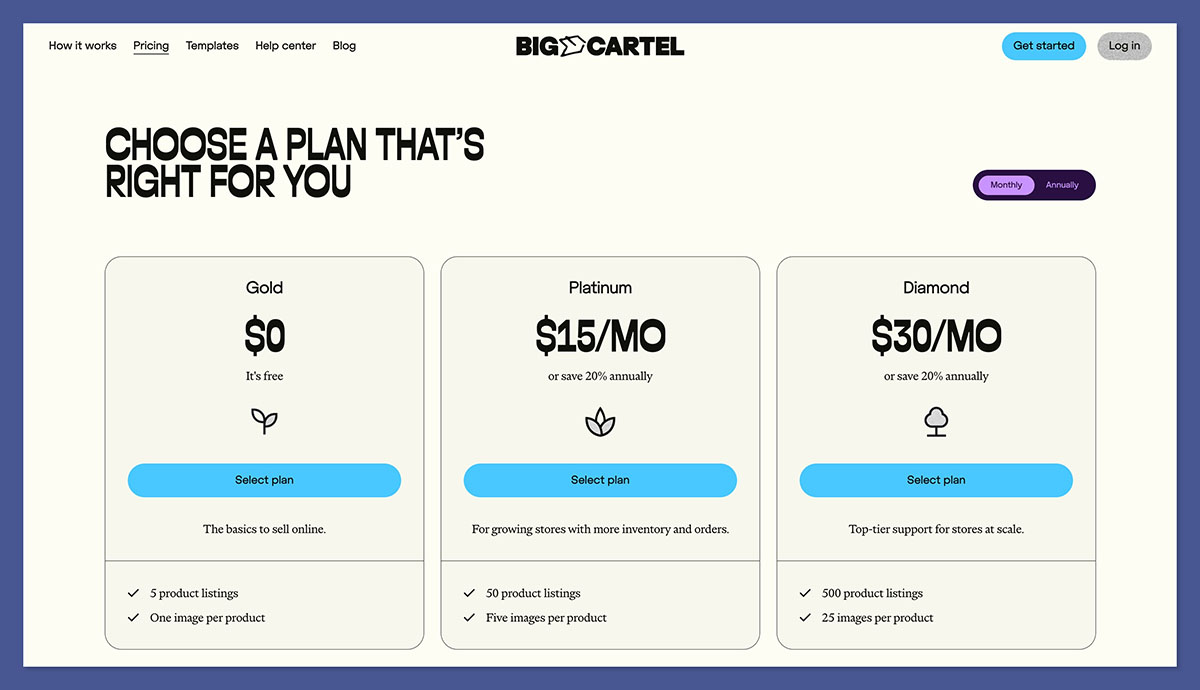
Big Cartel’s Plans:
- Free plan — up to 5 products
- Platinum ($15/month) — up to 50 products
- Diamond ($30/month) — up to 500 products
And here’s what impressed me early on: no transaction fees. You still pay Stripe or PayPal fees, of course — but Big Cartel doesn’t take an extra cut on top.
That keeps things clean and predictable.
But the trade-off? You’re giving up features. There’s no app store. No abandoned cart recovery. No real analytics.
If you’re trying to grow or market your products long-term, you’ll hit a wall.
Now let’s look at Shopify.
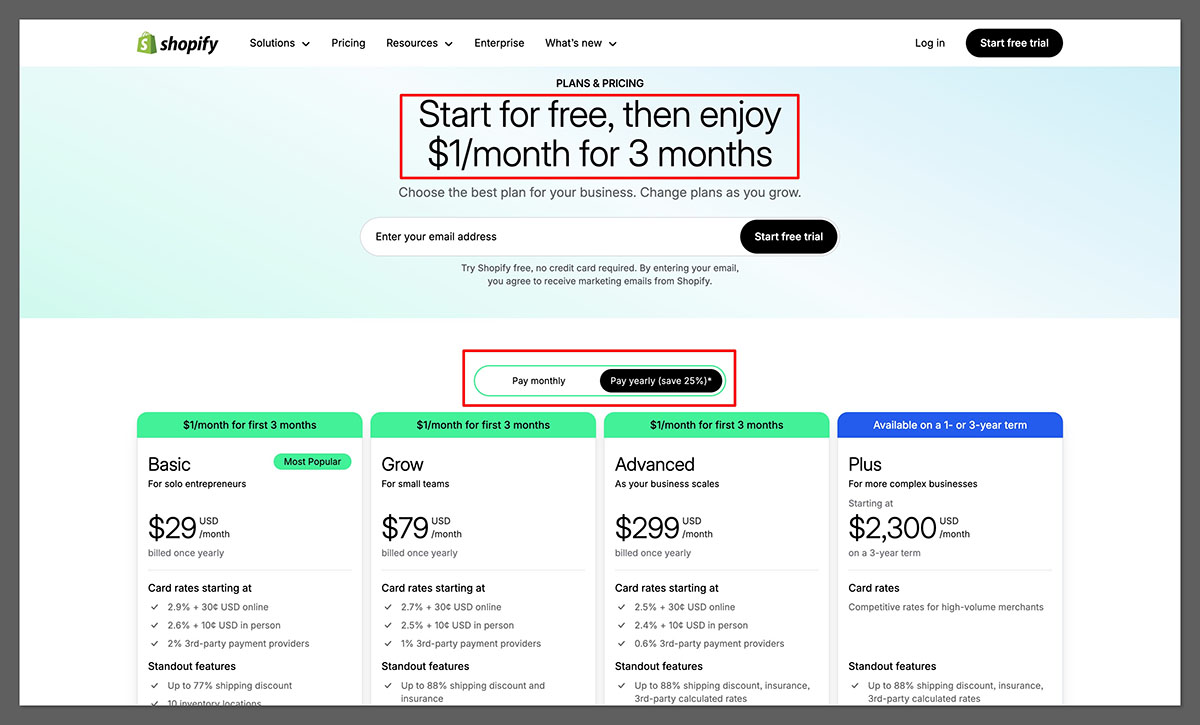
Shopify’s Plans:
- Basic ($29/month)
- Grow ($79/month)
- Advanced ($299/month)
- Plus plans for larger teams and enterprise users
Yes, it’s more expensive. But you’re paying for scalability. Shopify offers a 3-day free trial, and then your first 3 months cost just $1/month — which gives you plenty of time to build and start selling before the real subscription kicks in.
And those extra tools? They’re not just bells and whistles. They save time, help you convert better, and drive more traffic.
When I started using Shopify seriously, I was amazed how quickly features like abandoned cart emails and app integrations started turning clicks into revenue.
Verdict:
Big Cartel wins on price, no question. But Shopify wins on long-term value. If you’re only ever going to sell 10–20 products and don’t need marketing tools, Big Cartel is fine.
If you’re trying to build something real? Start with Shopify. Trust me — I’ve seen what happens when sellers have to migrate six months later. It’s messy and expensive. Start strong.
Best for Selling Online: Shopify Wins Hands Down
This is where the gap between Shopify and Big Cartel really starts to widen. If pricing was a bit closer, selling features are a straight-up landslide.
Shopify gives you the kind of selling power I wish I had when I was starting out — while Big Cartel gives you the basics, and not much else.
Let’s break it down.
When I tested Shopify’s selling features, I could set up product variations, link collections, apply automated discounts, and create bundles — all without using a single app.
I could also recover abandoned carts, segment customers, and tag VIP buyers to run exclusive offers later.
Now compare that with Big Cartel. I could create products and add prices, sure. I could also create a promo code and track inventory. That’s about it.
There’s no option for bundling products. No automation. No cart recovery. No upselling or cross-selling unless you code it yourself. You get the tools to sell — but none of the tools to sell better.
Even Shopify’s built-in AI tool, Shopify Magic, helped me write product descriptions in seconds. Big Cartel doesn’t offer anything like that.
It’s worth mentioning that Shopify lets you sell across multiple channels — Amazon, eBay, Facebook, Instagram, TikTok.
I’ve run shops that had one dashboard and sold in six places. Big Cartel is just your site. There’s no multichannel selling here.
Verdict:
Shopify gives you every feature I need to actually make money. Not just list products — but convert, retain, and grow.
Big Cartel? It works if you want a bare storefront. That’s about it.
Payment Options: Shopify Offers More Flexibility
Payment flexibility is underrated. And I learned this the hard way when I lost customers because I couldn’t offer the payment method they wanted.
Shopify solves that. Right from the dashboard, I could connect with over 100+ payment providers, including PayPal, Apple Pay, Klarna, Google Pay, and more.
I could even offer Buy Now, Pay Later options — which is huge for conversions in fashion and lifestyle stores.
They also have Shopify Payments, their in-house solution, which lets you avoid extra transaction fees. That means more margin in your pocket.
Big Cartel? It’s way simpler — Stripe and PayPal only. That’s it. You’re limited to two options, and if your audience wants to pay with something like Klarna or Google Pay — tough luck.
There’s no Shopify-like payments system, and no ability to customise checkout beyond the basics.
Now yes, Big Cartel doesn’t charge platform fees, which sounds great — but in reality, Shopify’s transaction fees are avoidable if you use Shopify Payments. So it kind of balances out.
Verdict:
If you just want a basic checkout, Big Cartel’s fine.
But if you want to offer more options and keep your margins healthy — Shopify’s got the edge. And I’ve seen conversion rates rise just by offering extra payment options.
App Market: Shopify Has a Full Ecosystem, Big Cartel Has… Nothing
Let me be blunt here. Shopify’s app store is ridiculous — in a good way.
There are 8,000+ apps, and they cover everything from subscription billing and upsells to shipping automations, Loyalty programs, and even custom product builders.
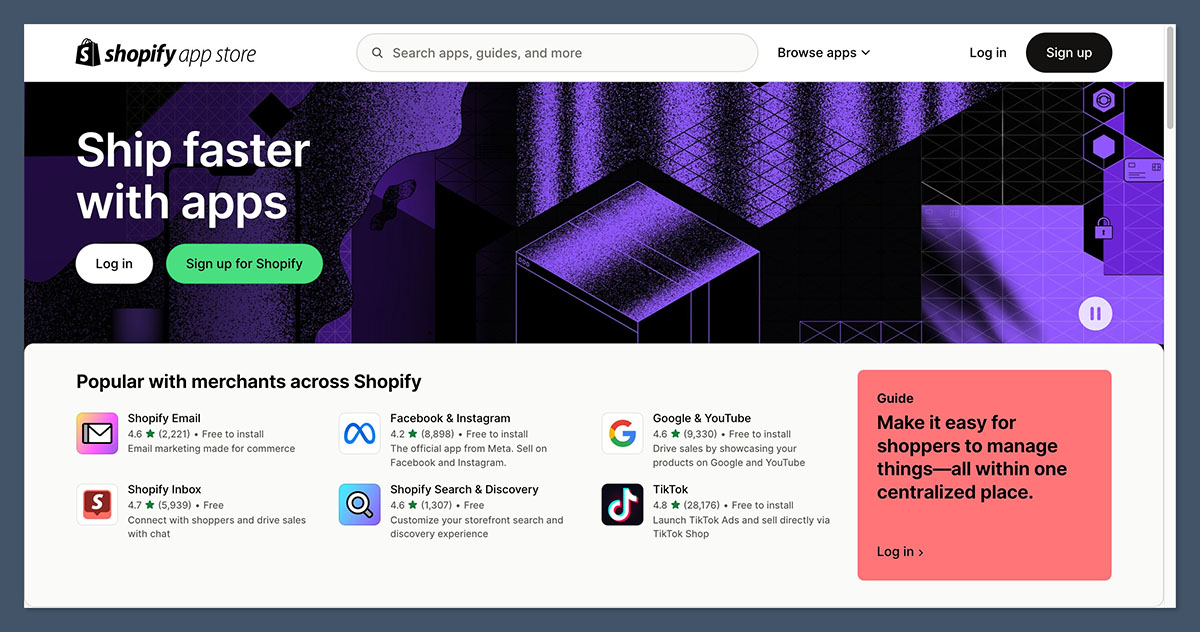
When I needed advanced review widgets, pop-ups, referral programs, or one-click post-purchase offers — I just clicked “Add App.” No code. No dev. Just results.
Big Cartel? It doesn’t have an app store.
At all.
You can add Google Analytics, connect a Facebook Pixel, and that’s about where the party ends. Everything else? You’ll need to manually add code or work around it.
If you want integrations, prepare to work harder or pay a developer.
And here’s the other side of it — Shopify’s apps scale with you. When you grow, you don’t need to leave Shopify. You just add what you need. With Big Cartel, you’ll be migrating the entire store when you outgrow it.
Verdict:
This one isn’t close. Shopify’s app ecosystem gives you everything you’ll need to grow. Big Cartel has no ecosystem — and no plans to build one either.
Best for Marketing: Shopify Makes It Easy, Big Cartel Makes You Work
Marketing is the make-or-break part of ecommerce. You could have the best product in the world — if nobody sees it, you’re not making sales.
Shopify understands this. Right out of the gate, I was able to run email campaigns through Shopify Email, set up product feeds for Google Shopping, and connect my store to Facebook, Instagram, and TikTok with zero stress.
I didn’t need Zapier. I didn’t need a developer. Just followed the prompts and it worked.
I’ve used Shopify’s Shopify Marketplace Connect app to sell on Amazon and Etsy, syncing inventory across all platforms from one dashboard.
This is a game-changer for product-based businesses trying to reach more customers.
You don’t get that kind of reach with Big Cartel.
Now let’s talk email. Shopify lets me create custom flows, abandoned cart emails, thank-you campaigns — all from within the platform.
You can even segment your audience and track performance. I’ve helped clients boost repeat purchases by over 30% just from email flows on Shopify.
On Big Cartel, none of this is built-in.
You can add a newsletter signup form if you embed it manually. But there’s no email tool, no campaign builder, and no analytics dashboard.
If you want any sort of automation or email growth, you’ll have to stitch it all together yourself using third-party tools — and even then, it’s clunky.
Verdict:
Shopify gives you real tools to grow your store — email, social, SEO, multi-channel selling.
Big Cartel? You’re on your own. It’s fine if you’ve already got an audience, but if you’re starting from scratch, Shopify gives you every chance to win.
Best for SEO: Shopify Is Built for Google, Big Cartel Isn’t
I can’t stress this enough — if organic traffic matters to you at all, do not choose Big Cartel.
I’ve worked on ecommerce SEO campaigns for years, and Shopify has always been one of the strongest platforms for ranking in Google. That’s not hype — that’s experience.
With Shopify, you can:
- Customise your meta titles and descriptions
- Edit your URL structure
- Add alt text to images
- Optimise your site speed
- Build content using Shopify’s built-in blog
- Automatically generate a sitemap.xml and robots.txt
- Use apps like Ecommerce Booster (powered by Semrush) for real-time SEO audits
These things matter. I’ve helped stores 5x their traffic just by cleaning up technical SEO using Shopify’s tools and apps.
Now let’s look at Big Cartel.
Big Cartel gives you very limited control. You can edit basic page titles and descriptions, but not URLs.
There’s no blogging functionality, which kills your content marketing strategy before it begins.
There’s no schema markup, and no built-in way to manage redirects or structured data.
And here’s the big one — Big Cartel doesn’t generate a proper sitemap. That’s brutal. You’re basically telling Google to guess how your site is structured.
Verdict:
This is black and white. Shopify is SEO-friendly, and you can rank well with it.
Big Cartel just isn’t built for search traffic. If Google matters to your business, this isn’t even a debate.
Best for Templates and Design: Shopify Offers More, and They Convert
When it comes to templates, it’s not just about what looks good — it’s about what sells.
Shopify gives you access to a huge library of over 100 professionally designed templates. There are 13 free options, and the rest are premium, priced between £100–£300 one-off.
These themes are built with mobile in mind, and I’ve tested multiple — they’re fast, clean, and conversion-optimised.
Each template is tailored to different industries — fashion, home goods, tech, beauty, fitness — and comes with customisation tools built into the editor.
You don’t need a developer. You can change colours, typography, layout, and sections — all with a few clicks.
Big Cartel, by comparison, offers 18 free themes. That’s it. No premium upgrades. No library by industry. And while they do offer basic code editing, most users won’t know how to use that anyway.
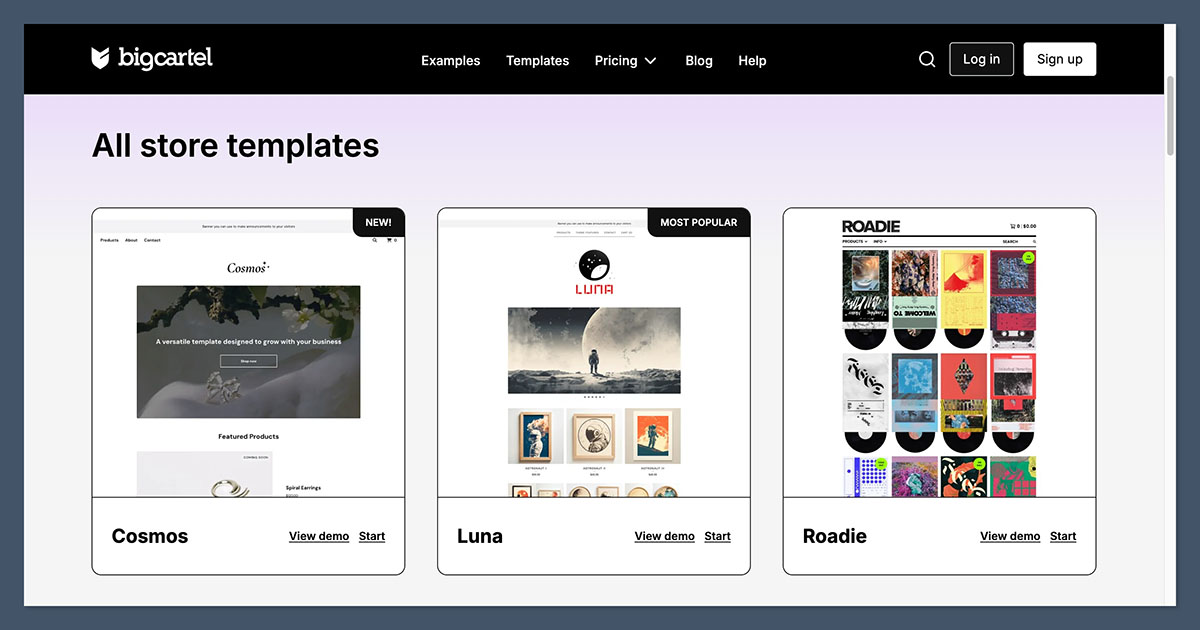
I tested multiple Big Cartel templates and they felt more like online art portfolios than ecommerce stores.
They’re minimal — which some people love — but they’re not built for conversions. There are no built-in call-to-action blocks, product upsells, or structured content areas.
Verdict:
If you want to build trust, look professional, and convert browsers into buyers — Shopify gives you that.
Big Cartel gives you basic themes that look “nice” but lack functionality.
Ease of Use: Big Cartel Is Simpler, Shopify Is Smarter
I’ll give Big Cartel some credit here — it’s one of the fastest setups I’ve ever done. I launched a store in under 20 minutes. It’s minimal and clean, and that simplicity will work well if you’re just getting started and don’t want to deal with tech.
But here’s what happens long-term — that simplicity becomes a limitation. You’ll start looking for features you just can’t access.
Shopify takes a bit longer to learn, but not much. Their onboarding now asks you specific questions:
- Are you just starting out or already selling?
- What are you selling and where?
- What’s your revenue stage?
And based on your answers, Shopify sets up your dashboard in a way that’s relevant to you. That saves time.
Once you’re in, everything’s easy. The theme editor uses a section-based layout, which is straightforward but flexible.
You don’t need to drag elements pixel by pixel — instead, you stack blocks like product carousels, featured collections, testimonials, and so on. Clean and conversion-focused.
Big Cartel also uses a section-based layout, but it’s extremely limited in comparison. You can’t add many new blocks or apps. What you see is what you get — and for many, that quickly becomes a bottleneck.
Verdict:
Big Cartel is simpler if you want to get online fast.
Shopify takes a few more hours to learn — but gives you way more room to grow, and makes everything feel logical. Once you’ve used both, the extra learning curve is 100% worth it.
Best for Business Support: Shopify Gives You 24/7 Help — Big Cartel Doesn’t
Support isn’t something you think about until you need it. But when your checkout crashes or an integration goes sideways, having proper support is priceless.
This is where Shopify clearly outperforms Big Cartel.
With Shopify, I’ve been able to reach out to 24/7 live chat any time I hit a roadblock — including during peak sales weekends.
Their agents are quick, helpful, and know what they’re doing. For higher-tier plans like Shopify Plus, you also get priority phone support, which makes a huge difference if you’re running serious volume.
Their Help Centre is stacked. I’ve used their articles, tutorials, and community forums to troubleshoot everything from payment issues to SEO problems.
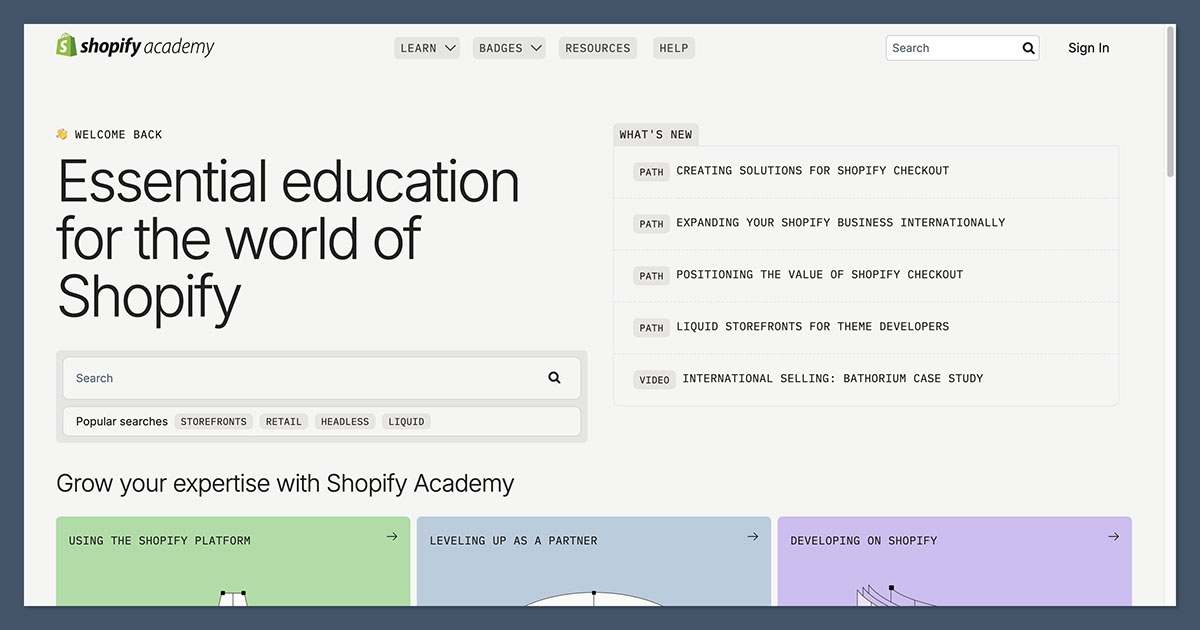
You also get access to their Academy, which has legit business training — not just how to use the platform, but how to grow.
Big Cartel? Much more limited.
Support is email only. No live chat. No phone. And it’s available Monday through Friday, during business hours. If your store breaks on a Saturday night — you wait.
There’s a small knowledge base with basic guides, but not much depth.
Even worse, there’s no real community to lean on.
Shopify has a massive ecosystem of partners, agencies, freelancers, and users who’ve solved every problem under the sun. Big Cartel just doesn’t have that infrastructure.
Verdict:
Shopify takes support seriously — and it shows. I’ve had real issues solved in under 10 minutes.
Big Cartel’s support is basic, slow, and only available during working hours. If you’re running a business, Shopify gives you peace of mind.
Final Verdict: Which One Should You Choose?
So here’s my honest take after working with both platforms, building stores, and watching clients either thrive — or struggle to migrate months later:
Choose Big Cartel if:
- You’re an artist or creative with under 50 products
- You just want something free and easy to launch
- You don’t need SEO, integrations, or marketing tools
It’s quick. It’s clean. And it’ll do the job if your needs are super basic. I’ve seen plenty of creatives make decent side income using it.
Choose Shopify if:
- You’re serious about building a brand
- You want to grow traffic through SEO
- You want email marketing, analytics, and real features
- You want support, scale, and flexibility built in
This platform has powered 60+ stores I’ve worked on — and every time, it helped them grow faster than expected. You’re not just buying a tool, you’re buying into an ecosystem that’s built for growth.
My Final Word?
Big Cartel is a stepping stone. Shopify is a foundation.
If I were starting over today — with no product, no audience, no team — I’d go with Shopify. Every. Single. Time.


